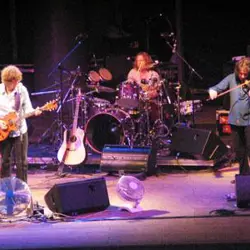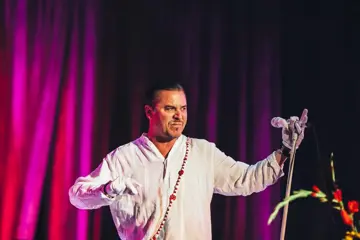 The Waterboys
The WaterboysThe sound of a stormy sea crashing on the beach welcomed The Waterboys onstage for their first ever show in Sydney. Formed in 1983, their trademark rich, Celtic folk-rock tradition was augmented this time around with the lyricism of great Irish poet WB Yeats.
Favouring material from their new album, An Appointment With Mr Yeats, frontman Mike Scott and his band – including the wonderful fiddle player Steve Wickham and vocalist and Brisbane native Sarah Calderwood – created a dark and delightfully whimsical mood. Unfortunately the band looked dwarfed on the expansive State Theatre stage and would've benefited from a much more intimate setting, but there were plenty of moments where the passionate clamour of the music more than made up for the emptiness of the stage.
The thin, scraggly Scott played the role of storyteller wonderfully well and was happy to involve the crowd, at one point asking if we Australians enjoyed nursery rhymes and rewarding a brave fan who started singing Jake The Peg with a cry of, “That's genius – and I mean that,” before the band played A Full Moon In March.
There was the mystical Song Of Wandering Aengus, but also the staunchly political September 1913. And though it may seem obvious, it was surprising to see just how suitable Yeats' poetry was to the musical arrangements The Waterboys were building around them. The Lake Isle Of Innisfree was this wonderfully bluesy, Dylan-esque rocker, while White Birds wooed as a delicate love song.
Don't miss a beat with our FREE daily newsletter
While some songs seemed to barely start before the band were putting down their instruments and moving on, other numbers blossomed into anarchic instrumentals and, at one point, masks were even donned in an attempt to draw the crowd even further into the mysteries of Yeats' world.
Though few outside of Waterboys and/or Yeats fans would have really enjoyed this show, it was a great way to reinvigorate Yeats' valuable canon.
















